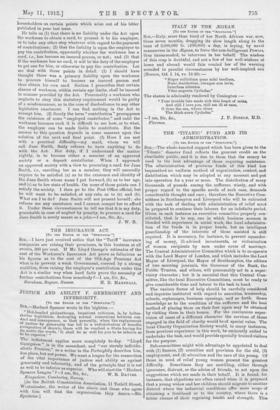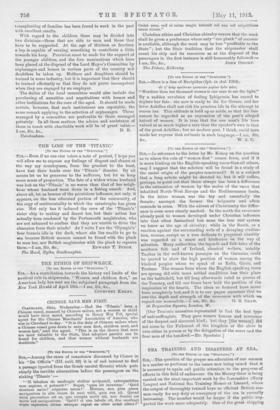THE 'TITANIC' FUND AND ITS - A DMINISTRATIO N.
• LTO THE EDITOR 07 THR "SPECTATOR."] Sin,—The whole-hearted support which has been given to the 'Titanic' disaster fund reflects the greatest credit on the charitable public, and it is due to them that the money be used to the best advantage of those requiring assistance. The administration of previous funds of this kind Las bequeathed no uniform method of organization, control, and distribution which may be adopted at any moment and put into operation for a year or more. The distribution of many thousands of pounds among the sufferers wisely, and with proper regard to the specific, needs of each case, demands considerable thought and care; therefore the Executive Com- mittees in Southampton and Liverpool who will be entrusted with the task of dealing with administration of relief must be prepared to continue their labours for an indefinite period. Given in each instance an executive committee properly con- stituted, that is to say, one in which business acumen is blended with experience in social work, the local administra- tion of the funds is in proper bands, but an intelligent guardianship of the interests of those assisted is still required. It is necessary, for instance, to prevent squander- ing of money, ill-advised investments, or victimization of women recipients by men under cover of marriage. The Central Administrative Committee which is to co-operate with the Lord Mayor of London, and which includes the Lord Mayor of Liverpool, the Mayor of Southampton, the editors of two morning journals, the Governor of the Bank, the Public Trustee, and others, will presumably act in a super- visory character ; but it is essential that this Central Com- mittee, like the local Executive Committees, must be ready to give considerable time and labour to the task in hand.
The various forms of help should be carefully considered and inquiries instituted with regard to annuities, trusteeship, schools, orphanages, business openings, and so forth. Some knowledge as to the condition of the sufferers and the best method of placing them on their feet again may be obtained by visiting them in their homes. For the continuous super- vision of cases of a different character the services of those engaged in the field of charity would be of special value. The local Charity Organization Society would, in many instances, from previous experience in this work, be eminently suited to undertake the task, and would provide specially trained visitors for the purpose. Sub-committees might with advantage be appointed to deal with (1) finance, (2) annuities and provision for the old, (3) employment, and (4) education and the care of the young, Of those in need of relief young women present the greatest difficulty. Sometimes they are unwilling, either through ignorance, distrust, or the advice of friends, to act upon the suggestions which are made in their behalf. It is found, for instance, that objections are often raised when it is proposed that a young widow and her children should migrate to another district where the industrial conditions offer more scope of obtaining a livelihood or to the country, where there is a better chance of their regaining health and strength. This transplanting of families has been found to work in the past with excellent results.
With regard to the children these may be divided into two divisions—those that are able to earn and those that have to be supported. At the age of thirteen op fourteen a boy is capable of earning something to contribute a little towards his keep. Provision must be made for the support of the younger children, and the free nominations which have been placed at the disposal of the Lord Mayor's Committee by orphanages and homes in various parts of the country will doubtless be taken up. Mothers and daughters should be trained in some industry, but it is important that they should be trained efficiently so that they do not prove incompetent when they are engaged by an employer.
The duties of the local committee would also include the purchasing of annuities and negotiations with homes and other institutions for the care of the aged. It should be made certain, however, that such institutions are reputable, the same remark applying to the selection of orphanages. Those managed by a committee are preferable to those managed privately. In all these matters the advice and assistance of those in touch with charitable work will be of great value.—











































 Previous page
Previous page